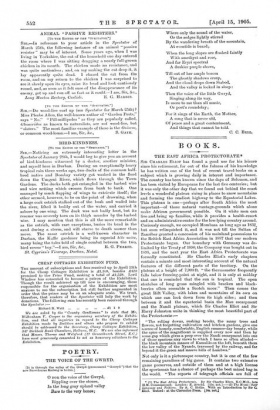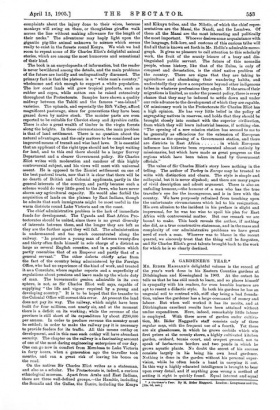BOOKS.
THE EAST AFRICA PROTECTORATE.*
SIR CHARLES ELIOT has found a good use for his leisure since his retirement, for out of the fulness of his knowledge he has written one of the best of recent travel-books on a subject which is growing daily in interest and importance.
The country has been known since the days of Solomon, and has been visited by Europeans for the last five centuries; but it was only the other day that we found out behind the coast levels a wonderful plateau rising in places to snow mountains and forming the readiest highway to the Equatorial Lakes.
This plateau is one—perhaps after South Africa the most important—of those natural vantage-grounds which alone
make African government possible. On it white men can live and bring up families, while it provides a health-resort and an administrative centre for the low-lying country around. Curiously enough, we occupied Mombasa as long ago as 1832, but soon relinquished it, and it was not till the Sultan of
Zanzibar granted a concession of his mainland possessions to the British East Africa Association in 1887 that our modern Protectorate began. Our boundary with Germany was de- limited by the Treaty of 1890, the Company was bought out in 1895, and the next year the East Africa Protectorate was formally constituted. Sir Charles Eliot's early chapters contain a minute and most interesting account of the natural features of the different parts of the territory. On the plateau at a height of 7,000 ft. " the thermometer frequently falls below freezing-point at night, and it is only at midday that one is reminded that the sun is tropical. The open stretches of long grass mingled with bracken and black- berries often resemble a Scotch moor." Then comes the great Rift Valley, with lakes and mountains of its own on which one can look down from its high sides ; and then between it and the equatorial basin the Mau escarpment and the Nandi plateau, which Sir Charles Eliot and Sir Harry Johnston unite in thinking the most beautiful part of the Protectorate:—
" The rolling downs, rushing brooks, the many trees and flowers, not forgetting cultivation and kitchen gardens, give one a sense of homely, comfortable, English summer-day beauty, while the spice of the magnificent is supplied every now and then by some gap which gives a peep over the Nandi escarpment into one of those spacious airy views to which I have so often alluded— the black mountain masses of Kamalilo on the left, beneath them the low valley of the Nyando, traversed by the railway, and far beyond it the green and mauve hills of Lumbwa."
Not only is it a picturesque country, but it is one of the few remaining paradises of big game. It contains two extensive game preserves, and outside of them and at a high license the sportsman has a chance of perhaps the best mixed bag in the world_ " The reports of telegraph officials are full of
• (1) The East Africa Protectorate. By Sir Charles Eliot. late H.M. Commissioner. London: E. Arnold. [159. net.]—(2) The Masai: their Language and Folklore. By A. C. 110109. With an Introduction by Sir C. Eliot. Oxford at the Clarendon Press. [11a net.]
complaints about the injury done to their wires, because monkeys will swing on them, or thoughtless giraffes walk across the line without making allowance for the length of their necks." The adventurer may haply light upon the gigantic pig-like animal unknown to science which seems really to exist in the forests round Kenya. We wish we had room to repeat some of Sir Charles Eliot's delightful animal stories, which are among the most humorous and sensational of their kind.
The book is an encyclopaedia of information, but the reader is never bewildered among the details, and the main problems of the future are lucidly and undogmatically discussed. The primary fact is that the plateau is a " white man's country," wholesome and rich enough to support a white population. The low coast lands will grow tropical products, such as rubber and copra, while cotton can be raised extensively throughout the Protectorate. Samples have shown a quality midway between the Tahiti and the famous " sea-island " varieties. The uplands, and especially the Rift Valley, afford magnificent pasturage, since for generations they have been grazed down by native stock. The moister parts are even reported to be suitable for Cheviot sheep and Ayrshire cattle. There is also a great wealth of timber in the virgin forests along the heights. In these circumstances, the main problem is that of land settlement. There is no question about the natural advantages, and the only matters to be considered are improved means of transit and wise land laws. It is essential that an applicant of the right type should not be kept waiting for land, and to this end there should be a larger Survey Department and a clearer Government policy. Sir Charles Eliot writes with moderation and candour of this highly controversial subject, and his views will meet with universal assent. He is opposed to the Zionist settlement on one of the best pastoral tracts, now that it is clear that there will be no dearth of British and Colonial applicants, partly in the general interests of the country, and partly because such a scheme would do very little good to the Jews, who have never shown any agricultural capacity. He would also forbid the acquisition of lands on the plateau by East Indians, though he admits that such immigrants might be most useful in the warm districts round Lake Victoria and on the coast.
The chief administrative problem is the lack of immediate funds for development. The Uganda and East Africa Pro- tectorates should be united, since there is no great diversity of interests between them, and the longer they are left as they are the further apart they will fall. The administration is undermanned and too much concentrated along the railway. "In practice a young man of between twenty-five and thirty often finds himself in sole charge of a district as large as several English counties, and in a position which partly resembles that of an Emperor and partly that of a general servant." The other defects chiefly arise from the fact of the country being administered by the Foreign Office, who had no experience of the kind of work, and treated it as a Consulate, where regular reports and a superfluity of regulations about pensions and leave made up the whole duty of man. The bureaucratic genius; admirable in its own sphere, is not, as Sir Charles Eliot well says, capable of supplying " the life and vigour required by a young and developing country." It is to be hoped that the transfer to the Colonial Office will correct this error. At present the land does not pay its way. The railway, which might have been built for four millions, cost nearly six, and at the moment there is a deficit on its working; while the revenue of the province is still short of its expenditure by about £200,000 per annum. In order to produce revenue the oountry must be settled; in order to make the railway pay it is necessary to provide feeders for its traffic. All this means outlay on development, and in this case such outlay will have abundant security. The chapter on the railway is a fascinating account of one of the most daring engineering enterprises of our day. One can go now in comfort from Mombasa to Lake Victoria in forty hours, when a generation ago the traveller took months, and ran a great risk of leaving his bones on the road.
On the natives Sir Charles Eliot writes as a statesman, and also as a scholar. The Protectorate is, indeed, a curious ethnological museum. Apart from Arabs and East Indians, there are three well-defined groups,—the Hamitic, including the Somalia and the Gallas, the Bantu, including the Kenya
and Kikuyu tribes, and the Nilotic, of which the chief repre- sentatives are the Masai, the Nandi, and the Lumbwa. Of them all the Masai are the most interesting and politically the most important. Whoever desires some acquaintance with the language, folk-lore, and customs of this curious tribe will find all that is known set forth in Mr. Hollis's admirable mono- graph. It gives us pleasure to call attention to this scholarly work, the fruit of the scanty leisure of a busy and dis- tinguished public servant. The future of this nomadic people, whose history, like that of the Zulus, is only of conquest and devastation, is the chief native problem of the country. There are signs that they are taking to agriculture and abandoning their wandering habits, and undoubtedly they show a competence beyond other indigenous tribes in whatever professions they adopt. If the area of their migrations is limited, as under the present policy, there is every chance that they may be induced to settle down and under our rule advance to the development of which they are capable. Of missionary work in the Protectorate Sir Charles Eliot has a high opinion. He has very little belief in the policy of segregating natives in reserves, and holds that they should be brought closely into contact with the superior civilisation, from which they will learn industrial lessons, if nothing else. "The opening of a new mission station has seemed to me to be generally as efficacious for the extension of European influence as the opening of a Government station, and there
are districts in East Africa in which European influence has hitherto been represented almost entirely by missionaries, but which have made as great progress as the regions which have been taken in hand by Government officials."
The value of Sir Charles Eliot's story loses nothing in the telling. The author of Turkey in Europe may be trusted to write with distinction and charm. The style is simple and colloquial, but it is never slipshod ; and there are many pages of vivid description and adroit argument. There is also an unfailing humour,—the humour of a man who has the true traveller's eye for the incongruous, and is in love with the country. We have purposely refrained from touching upon the unfortunate circumstances which led to his resignation. His own allusion to the incident in his preface is slight and impersonal, for he was too wise to spoil his plea for East Africa with controversial matter. But one remark we are bound to make. This book reveals the author, if nothing else did, as a true constructive statesman, and in the mass and complexity of our administrative problems we have great need of such a man. Whoever was to blame in the recent quarrel, we sincerely trust that the thing will be forgotten, and Sir Charles Eliot's great talents brought back to the work for which he is so clearly destined.











































 Previous page
Previous page